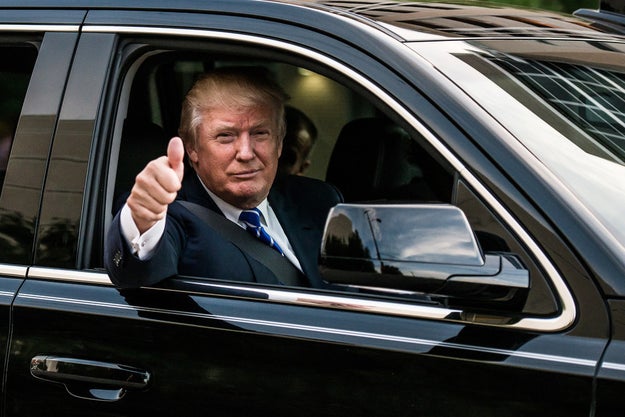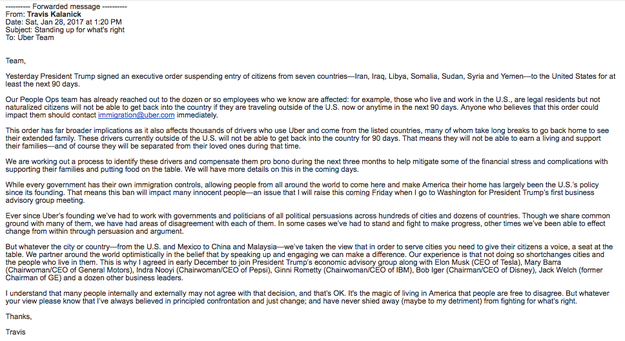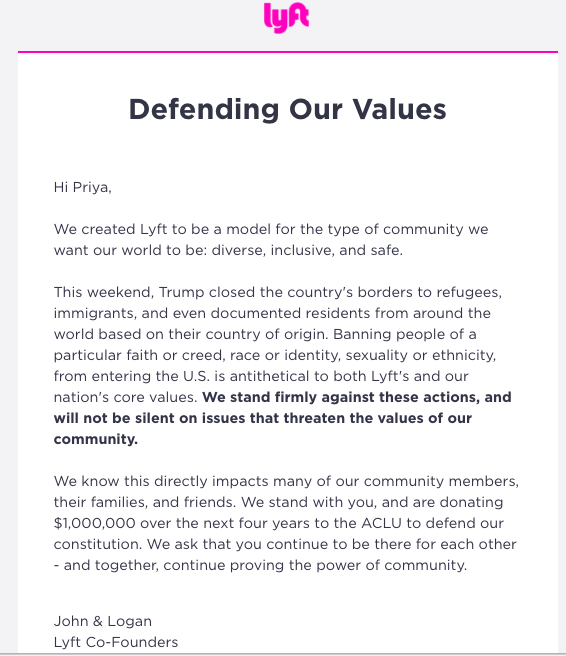
Getty
In the 36 hours between President Trump’s signing of an executive order restricting immigration and the same rule’s effects being halted by a federal judge in New York, the rivalry between Uber and Lyft abruptly became political. Largely as a result of its CEO’s decision to serve as a Trump advisor, Uber is facing a hashtag-driven social media revolt – even though it appears to be doing more to support drivers affected by the new immigration ban than Lyft.
In Trump’s politicized America, brands are caught up in a rapidly evolving political crisis, and are being forced to take sides. Trump’s executive order suspended the intake of all refugees for 120 days and Syrian refugees indefinitely. It also blocked people from Syria, Iraq, Iran, Sudan, Somalia, Libya, and Yemen from entering the US for 90 days. In the hours following the order, as the scope of the order became clear, pressure mounted on tech companies – who employ many immigrants on H1B visas – to publicly respond. For Uber and Lyft, who already compete for users with nearly identical services in a number of deeply anti-Trump cities, the ramifications of their political statements were immediately evident. By Saturday evening #DeleteUber was trending on Twitter. Meanwhile, Lyft was being touted as an easy Uber alternative and lauded for its denunciation of Trump and $1 million donation to the American Civil Liberties Union.
Shortly after noon on Saturday — less than 10 hours after Trump signed the executive order — Uber told BuzzFeed it had reached out to about a dozen employees who may be affected with offers of support, including legal help. Travis Kalanick, the ride-hail giant’s chief executive, who has agreed to sit on Trump’s economic advisory group, prompting protests outside Uber’s San Francisco headquarters, emailed staff at 1:20PM.

If any Uber driver was outside the country and could not reenter as a result of the executive order, Uber would compensate that driver pro bono “to help mitigate some of the financial stress and complications with supporting their families and putting food on the table.”
Uber has disagreed with governments across the world before, Kalanick said, adding that it has effected change by fighting in some cases, and in others, “from within through persuasion and argument.” He promised that the executive order, shortened as #MuslimBan on social media, was “an issue that I will raise this coming Friday when I go to Washington for President Trump’s first business advisory group meeting.”
Five hours later, Lyft’s cofounders emailed their staff, too.

What people saw when they compared the statements: Uber is willing to work with Trump. Lyft is “firmly against” Trump’s actions.
Uber had responded faster to Trump's executive order, focusing on how it could help its employees. Lyft responded later – without some of the promises Uber made – but its broad denunciation of Trump’s refugee ban drew praise. Lyft’s leaders directly condemned Trump’s executive order as “antithetical to both Lyft’s and our nation’s core values" (It’s worth noting that tech billionaire and Trump advisor Peter Thiel is a Lyft investor who has publicly criticized Uber for being “ethically challenged.") While Kalanick’s statement was one of the stronger ones to be issued by a tech CEO, it didn’t directly reject Trump. Instead, Kalanick said, “whatever your view please know that I’ve always believed in principled confrontation and just change; and have never shied away (maybe to my detriment) from fighting for what’s right.”
Kalanick also posted his note to staff, with the subject line “Standing up for what’s right,” on Facebook.
Making the optics even worse for Uber, the company had suspended surge pricing near New York’s JFK Airport after taxi drivers stopped working to join anti-Trump protests there. To some, the move appeared to undercut the protesting taxi drivers – many of whom are Muslim and immigrants – by keeping prices stable to entice riders. #DeleteUber began trending on Twitter.
Within a few hours, Uber apologized.
“We’re sorry for any confusion about our earlier tweet — it was not meant to break up any strike,” Uber told BuzzFeed News in a statement. “We wanted people to know they could use Uber to get to and from JFK at normal prices, especially tonight.”
On Sunday morning, Lyft sent users an email reiterating its position and noting it would donate $1 million to the American Civil Liberties Union “to defend our constitution.”

The email helped Lyft further capitalize on the political tension that riled its – and Uber’s – user base and spurred the #DeleteUber to trend on Twitter the prior night.
Meanwhile, Uber crafted a conciliatory response to riders who noted the company’s willingness to collaborate with Trump as their reason for deleting the app. “We share your concern that this ban will impact many thousands of innocent people,” it read, with a link to Kalanick’s full statement.
Uber did not immediately reply to a request for comment as to whether it was sending this response to every individual who cited the company’s relationship with Trump as a reason for deleting the app. But it appears others received a similar response as well.
Kalanick’s position as Trump advisor is causing internal tensions at Uber as well. On Saturday, after Kalanick’s email to staff, a software developer said he should resign from Trump’s advisory group and explicitly denounce the president.
Last week, Business Insider published portions of an internal email in which Uber’s chief technology officer called Trump a “deplorable person.”
Read how other tech companies reacted to Trump’s executive order here.
from BuzzFeed - Tech https://www.buzzfeed.com/priya/the-battle-between-uber-and-lyft-has-become-political?utm_term=4ldqpia
No comments:
Post a Comment